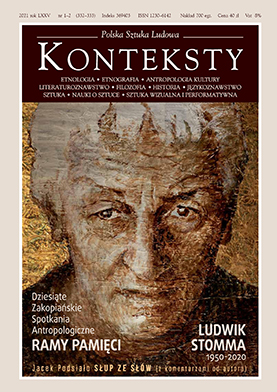„Bez powrotów biografie”. Wokół Przeklętych Stanisława Wygodzkiego
“Biographies without Returns”. About Przeklęci The Damned by Stanisław Wygodzki
Author(s): Arkadiusz MorawiecSubject(s): Fine Arts / Performing Arts
Published by: Instytut Sztuki Polskiej Akademii Nauk
Keywords: Stanisław Wygodzki
Summary/Abstract: The article pertains to Przeklęci (The Damned) by Stanisław Wygodzki, published in 1969 in “Wiadomości”, a periodical issued in London. It reflects, albeit indirectly, the author’s biography and the forces determining it. The origin of the work is delineated by Wygodzki’s painful experiences (the extermination of his entire family in Auschwitz-Birkenau, his internment in concentration camps, and emigration to Israel in 1968), as well as a fragment of Rok w Treblince (A Year in Treblinka) – the reminiscences of Jankiel Wiernik about a German woman and her children, murdered in a German death camp, which comprise the canvas of Przeklęci. The semantic stratum and, simultaneously, the function of the novel (which the article considers within the context of other texts by the author in question: literary, autobiographical and publicistic) are defined by original artistic solutions, in particular, the use of the convention of Gothic fiction, exceptional in Holocaust literature of the past. The text by Wygodzki, bearing an autobiographical stigma, can be deciphered on numerous levels: as a form of self-therapy, a story about the extermination of the Jews, and a parable of March 1968, but predominantly as a warning addressed to those who resort to the policy of exclusion. Przeklęci – a work by a commu-nist and a Jew who considered Poland to be his homeland, makes the reader aware just how little is required (inattention, coincidence) or how outright nothing is needed to find oneself on the other side of that which is disowned, regarded as undesirable or entirely inhuman.
Journal: Konteksty
- Issue Year: 332/2021
- Issue No: 1-2
- Page Range: 236-245
- Page Count: 10
- Language: Polish
- Content File-PDF

